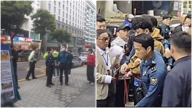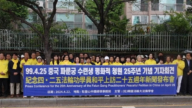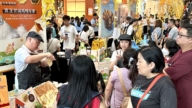【新唐人2014年08月16日讯】近来,中共对多个行业开展了大规模“反垄断”调查,除了电脑软体巨头微软、晶元制造商高通等遭调查外,还有一千多家中外汽车企业被调查。周三,中国欧盟商会发声明,指责中共不公平地,使用强硬手段对待外国公司。
中国欧盟商会在8月13号发布声明表示,对中共当局进行所谓“反垄断”调查的方式表达了担忧。
欧盟商会认为,调查不能预设结果,被调查企业必须获得完全的辩护权利。但令人不安的是,中共当局并没有系统地执行这样的做法。
欧盟商会表示,他们已经收到一些行业中“令人警觉” 的报告,提到中共当局对相关企业采用威胁性的行政手段,让企业无法对指控进行抗辩,也无法向律师或商会等外部资源求助。
欧盟商会指出,欧洲企业质疑,外国企业被中共反垄断调查的现象和市场现状不成比例。在一些行业中,中国本土企业并没有因为类似违法行为而受到调查,甚至在一些合资企业案例中,也只有外方被调查。
《新唐人》特约经济评论员杰森•马:“现在中共打出这个反垄断牌子,是因为中共现在整体经济发展乏力,它感觉到自己的市场份额,国外的企业已经很依赖于中国这个市场,它有能力以自己的市场要胁,来打压一下海外的企业,某种程度上讲它还是想扶持中国自身的企业。当然它这个过程中是完全违背国际基本法规的。 ”
《新唐人》特约经济评员家杰森•马指出,实际上,海外的企业在中国占的市场份额不大,而且都是靠技术领先,中共真正想扶持一般的企业,只要把交通、媒体、能源、电信等方方面面的国企垄断打掉,那才是对中国一般企业真正的扶持。
目前,欧盟商会旗下有1800家会员企业,在中国地区设有业务。
过去一个月以来,包括电脑软体巨头微软,和晶元制造商高通在内的美国公司,都受到中共所谓的“反垄断”调查,同时国外的汽车、日用品等多个行业,也遭到大规模所谓的“反垄断”调查,汽车行业尤为突出。
中共媒体指责,欧美汽车品牌在中国市场售价太高,多家国外汽车制造商被当局施压,要求降价。包括捷豹、路虎、一汽大众、奥迪、宝马、奔驰等外资车企纷纷大幅降价,希望向中共发改委示好。
欧洲企业以外,日本12家企业的汽车零部件和轴承价格也被所谓的“反垄断”调查,并遭到处罚。
《中国日报》英文版8月13日报导说,中共发改委官员证实,目前有超过一千家中外汽车企业正接受所谓的“反垄断”调查。这名官员还说,目前的调查范围虽然同时包括中外企业,但中资汽车企业的垄断市场问题, 远不及外资车企严重。
美国“南卡罗莱纳大学”教授谢田分析认为,这些被调查的外资车企根本谈不上“垄断”,中共对这些企业的举措,完全不像商业“反垄断”行为。
美国“南卡罗莱纳大学”教授谢田:“中共同时对德国、美国,其他好几个国家的不同类型、不同行业的公司同时出击,显然不像是一个纯粹的经济上或商业上的行为,更像是一种政治行为,很可能涉及到某一派的人,从某一些外国公司的合作中获益,而导致另一派人现在开始反攻。”
中国欧盟商会建议,中国必须继续透明、全面且持续的实施《反垄断法》,并始终秉持公平对待商界的原则。而在反垄断调查的透明性方面,欧盟委员会可为中国提供范例。
采访/陈汉 编辑/李韵 后制/肖颜
EU Chamber of Commerce Criticizes China Anti-trust Probe
Involving 1,000 Car Makers
The Chinese Communist Party (CCP) has launched large-scale
anti-monopoly investigations on multiple industries.
In addition to technology companies like Microsoft
and Qualcomm being hit by the recent campaign,
over 1,000 foreign car companies are being investigated.
On Wednesday, the European Union Chamber of Commerce
in China issued a statement accusing the CCP of unfairly
using tough measures for treating foreign companies.
The EU-China Chamber of Commerce issued a statement
on Aug. 13, expressing concerns about the recent supposed
anti-trust investigation launched by Chinese authorities.
The EU Chamber of Commerce says that the results
of the investigation can’t be predetermined,
and the enterprises under investigation must be endowed
fully with the right to a defense.
But disturbingly, the Chinese Communist authorities
haven’t systematically implemented such practices.
The EU Chamber of Commerce say they’ve received
“alarming" reports from some industries,
which mentioned that Chinese authorities adopted
administrative measures to threaten relevant enterprises,
leaving them unable to defend against the allegations,
nor resort to external resources such as lawyers
or Chamber of Commerce for help.
The EU Chamber of Commerce pointed out
that European companies have said
that the investigated foreign companies were
out of proportion of their market share.
In some industries, Chinese companies have not been
investigated for their similar offenses,
and in some cases, only the foreign party
of a joint venture was investigated.
Jason Ma, NTD economic commentator:
“The CCP is playing this anti-trust card now because its
overall economic situation is weak, and they felt that foreign
companies had been very dependent on China’s market.
This gave the CCP the leverage to threaten and suppress
overseas enterprises via its own market.
To some extent, the CCP still wants to support China’s own
companies. Of course this process completely violates
the basic international regulations."
Ma says that, in fact, overseas enterprises in China account
for an insignificant market share, and their market shares
are achieved by their technological advantages.
Ma says that if the CCP really wants to support general
business, as long as the state-owned monopoly of industries
such as transportation, media, energy, telecommunications
and all other aspects are destroyed,
then that is truly supporting
the development of general business in China.
Currently, there are 1,800 member companies
of the EU Chamber in China.
In past month, American companies including
computer software giant Microsoft and technology company
Qualcomm have been among those targeted
in the CCP’s so-called anti-monopoly investigation.
Meanwhile, multiple industries such as foreign cars,
commodities and so on have also suffered from
the large-scale campaign, with its effects particularly
prominent in the automotive industry.
CCP media have accused European and American automobile
brands of selling at prices too high in the Chinese market.
A number of foreign car manufacturers
have been pressured by the CCP authorities to cut prices.
Jaguar Land Rover, Volkswagen, Audi, BMW, Mercedes and
other foreign car companies have slashed prices in China,
hoping to curry favor with the CCP’s National Development
& Reform Commission (NDRC).
In addition to European companies, the auto parts
and bearings prices of 12 Japanese companies
have also been subjected to the anti-monopoly
investigations and punishments.
The English language version of China Daily reported on
Aug. 13 that the CCP’s NDRC officials confirmed
that more than 1,000 foreign car companies have faced
the so-called investigation.
The officials also said that although the scope of the current
investigation covers both Chinese and foreign enterprises,
the situation of the Chinese car companies’ monopoly of the
market is far less severe than foreign counterparts.
Professor Frank Xie from the University of South Carolina
in the U.S. says that investigations of these foreign car
companies have nothing with “monopoly."
Xie says the measures the CCP has used against foreign
companies are unlike any others used to curb monopolies.
Frank Xie: “CCP authorities have attacked different types of
companies in different industries and from countries such as
Germany, the U.S., and several other countries at once.
This is clearly unlike an action purely based on
economic or commercial considerations.
It’s more like a political act.
It probably involves a particular faction of the CCP which has
benefitted from cooperating with foreign companies,
and has hence led to another faction’s counterattack."
The EU-China Chamber of Commerce suggested that China
must continue to transparently, comprehensively and
sustainably implement the anti-trust law and always uphold
the principle of fairly treating the business community.
In terms of the transparency of the anti-trust investigation,
the European Commission may provide
the best practices for China.
Interview/ChenHan Edit/LiYun Post-Production/XiaoYan

























